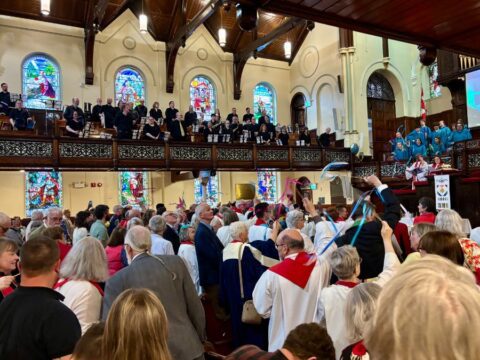The future of the United Church’s innovation arm is in question, as the General Council office considers cutting ties. EDGE, a network with the mandate to plant new church ministries and cultivate congregational renewal, is housed at the national office in Toronto. But the review, currently underway as part of the United Church’s new strategic plan, is sparking discussion about its place in a dwindling institution.
“Our question is, ‘Do we pull it in tighter or do we let it go as it was intended?’” says Rev. Michael Blair, the general secretary of The United Church of Canada, confirming that the network may become self-sufficient following an ongoing audit.
Since it was integrated into the General Council office in 2014, EDGE has launched hundreds of new ministries, social enterprises and grassroots programs, including Buy United and the United Property Resource Corporation.
“EDGE is generating as much value as it is costing the church,” says EDGE executive director Rob Dalgleish. “The church is putting in money, but getting back grants, procurement value and partnership with Kindred Works.” According to Dalgleish, the General Council office designates $300,000 in core funding per fiscal year to cover staffing costs for the five permanent full-time and three part-time contract employees.
EDGE started in 2011 as a three-year project focused on activating and renewing innovative ministries in the denomination. The network emerged, says Dalgleish, from a recognition that the United Church was in a period of decline and needed to foster a culture of experimentation. “We were coming into a new time, changes were needed, and congregations were declining and highly resistant to change. And so some support was needed to help with a new approach to ministry.”
Carla Leon, a former staffperson at EDGE, is hopeful that the network will continue, even if it’s no longer officially tied to The United Church of Canada. “It’s the idea of EDGE that’s important. EDGE as a movement and as a mindset is already happening — that is not going away,” she says.
“EDGE going external and serving a larger vision of innovation in the church might feel scary, I suppose, but maybe that’s the big vision that we were destined to do,” she adds.
Despite being housed within the United Church’s national office, EDGE has long engaged in ecumenical work and has shared its learnings with other denominations, including the United Church of Christ in the United States.
“Is this the time where EDGE actually becomes the innovation arm of all denominations, so that it’s even more hopeful?”
The General Council office is expected to have an auditor’s report on EDGE programming available by late August or early September, at which time it will make a decision regarding the future of its relationship with the network. “I think we would be cutting off our nose to save our face if we got rid of an innovative space in the life of the church,” Blair says. He affirms EDGE’s work, but says the church is trying to figure out “where it sits.”
According to Blair, the communications unit of the General Council office is also the subject of an external review. In fact, the auditor’s report on the department — which focuses, among other things, on the effectiveness of its communications tools — is already complete, but no decisions have yet been made. An internal review of the United Church’s global partnerships is also set to take place, but no decisions will likely be made until the new year.
The reviews are meant, Blair says, to assess the scope and nature of the church’s work. “We’re wanting to sharpen the work we do — to make it clear. We’re also wanting to be able to report back to the church in very robust ways in terms of the impact of the work of the church.”
More on Broadview:
- Let’s stop obsessing about the United Church’s demise, says outgoing moderator
- Innovative church rental site receives $50K United Church grant
- Forget condos, these churches will become affordable rental units
Blair acknowledges that fiscal constraints have led to a climate of anxiety within the General Council office. “Every couple of years, for financial reasons, we’ve had to address staffing concerns. In the context of the budget, there are literally only two places we can do reduction — staffing or grants,” he says. “There’s some anxiety whenever we do this kind of work; people think it’s going to lead to staff cuts.”
Staff concerns about potential cuts, he believes, have been exacerbated as other priorities take precedence over fully engaging with the work of the review and communicating with staff. Blair says he has not been able to attend to the auditor’s report of the communications unit due to other pressing work, and the delay in sharing its implications has stoked worries among General Council staff.
The General Council office is currently preoccupied with facilitating the business of General Council 44 — a virtual gathering that will culminate in five days of decision sessions between July 21 and July 25, followed by closing worship and the installation of a new moderator on Aug. 7.
“If this was not a General Council year, and it wasn’t a long General Council, folks may feel differently, but we’re working [on this review process] in the midst of a seven-month General Council,” he says.
Meanwhile, Leon is optimistic that EDGE will expand its horizons in the aftermath of the review. “Is this the time for transformation?” she asks. “Is this the time where EDGE actually becomes the innovation arm of all denominations, so that it’s even more hopeful?”
***
Julie McGonegal is an associate editor at Broadview.















What has Edge accomplished since its beginning? What are some of its concrete ideas? What is the meaning of its ministry? What are some concrete ideas that the United church would like to see in ministry? Maybe there’s something missing here but the full meaning isn’t coming through to me. Simple points; simple language is the key to understanding. Everyone has different ideas about God and a church’s dogmatic teaching isn’t going to work. However, the Church must focus on the goodness in humanity; those things we have in common; the power of love and caring and the noble aspects of our being. Was EDGE doing that? If so, it seems like a valuable project.